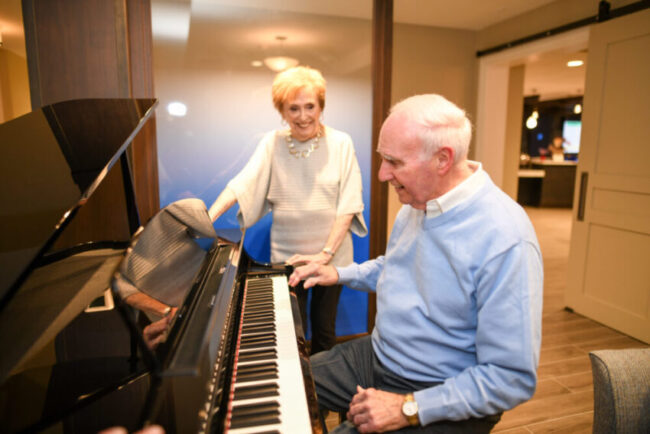The Powerful Connection Between Music and Memory

Music has a powerful connection to memory, offering a variety of benefits for individuals with Alzheimer’s disease and other forms of dementia. Research has shown that music can help reduce agitation, depression and anxiety while also lowering stress levels.
Why Is Music So Powerful for Individuals with Alzheimer’s?
Researchers believe that engaging with music—whether through singing or listening to favorite songs—can have a profound impact, as key brain functions linked to musical memory often remain intact despite the disease. Additionally, music may enhance cognitive function and memory in individuals with dementia.
Music also provides relief for caregivers. If you have a loved one with dementia, you may find that music helps improve communication and fosters a stronger connection.
At New Pond Village, we recognize the significant role music plays in enhancing the quality of life for residents in our Mind & Memory Care neighborhood. Let’s explore how music stimulates brain activity and how we incorporate it into daily life in our memory care community.
Recalling Emotions Through Music
Even as Alzheimer’s and other types of dementia progress, musical appreciation and aptitude often remain intact. This makes music a valuable tool for connecting with individuals in advanced stages of the disease.
Neurologists have found that music can trigger memories and emotions associated with past events. This process can enhance cognitive skills and foster a sense of familiarity and comfort.
Reducing Stress and Enhancing Well-Being
Music is known to help manage stress, agitation and negative emotions in individuals with dementia. It can also aid coordination for those experiencing movement difficulties. Since music requires minimal cognitive effort, even individuals with severe impairment can engage and benefit from it.
Strengthening Connections and Encouraging Interaction
By evoking positive memories and emotions, music encourages both physical and emotional closeness. Listening to music activates the right side of the brain, while singing engages the left, creating a holistic brain-stimulating experience.
For individuals in the later stages of dementia, music can inspire movement and expressions of affection, such as dancing or hugging. These moments of connection can help them feel more secure and may even unlock additional memories.
Making Music a Part of Daily Life at New Pond Village
At New Pond Village, we integrate music into daily routines within our Mind & Memory Care neighborhood. By selecting music that is familiar, promotes movement and fosters a positive mood, we use music as a powerful tool to stimulate memory, encourage interaction and create meaningful personal connections.
Music and memory share a deep, lasting bond. Through thoughtful musical engagement, we strive to enrich the lives of our residents and support their overall well-being.
Mind and Memory Care at New Pond Village
In our Mind & Memory Care neighborhood, we prioritize creating an environment that supports both the physical and emotional well-being of each resident. With personalized care plans tailored to their individual needs, we offer a thoughtful approach to daily living, ensuring that every detail—from sensory dining experiences to carefully chosen colors, lighting, and music—enhances comfort and connection. Our goal is to empower residents by keeping them engaged, active and part of a vibrant community, where each moment is meaningful and every need is thoughtfully met.